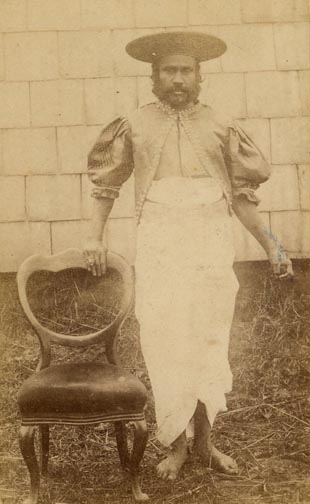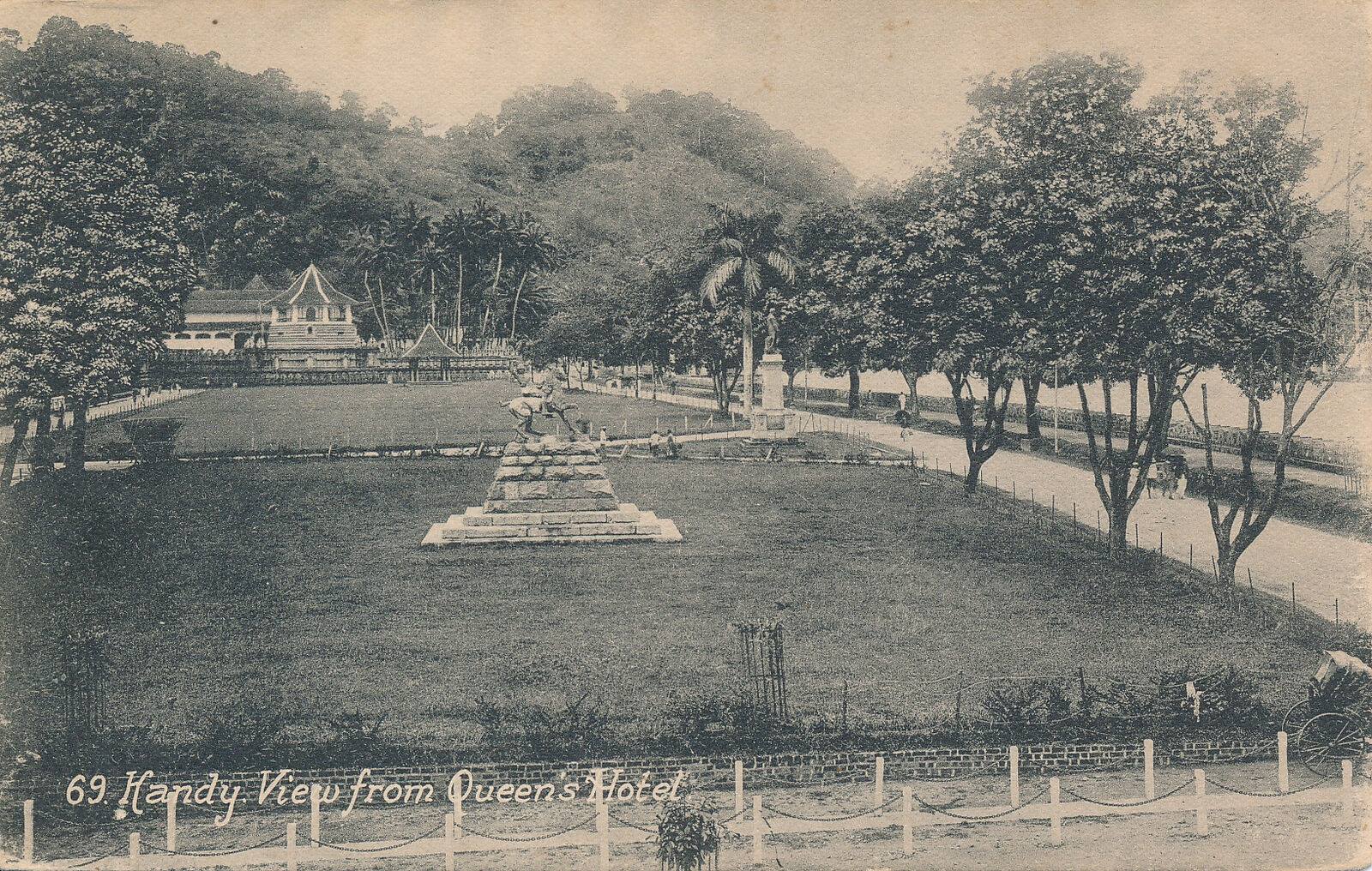Villagers in the Malwatte Village
පිළිවලින් ඊළඟට වැදගත්කමක් උසුලන චරිතය වන්නේ රංහාමිය. ඔහු ආරච්චි; ප්රධාන කොස්තාපල්, ගම්මුලාදෑනි, බදු මුලාදෑනි සහ තව නොයෙක් නානාවිධ තනතුරු දරන්නේය. ඔහු කෝරාළගේ දකුණු අත සේ සැලකේ. අධික තරබාරු කමක් නැතත් මොට්ට චරිතයකි. තමුන්ගේ ලාභය ගැන බොහෝ සැලකිලිමත්ය.
මල්වත්තේ ගම්වැසියෝ
මල්වත්ත ගැමියන් අතරේ ඔහු වැජඹෙන ආකාරයද ඔහුගෙන් ගම්මානය ලබන කල එළියද බොහෝ පුදුම සහගතය. රංහාමි ගමේ මනුස්සයෙකු නොවේ. ඒ පළාතේ කෙනෙක්ද නොවේ. කෝරාළ හැරෙන්නට වෙන කිසිවෙකු රංහාමි පැමිණියේ කොයි සිටදැයි දැන සිටියේ නැත. ඔහුටත් බොහෝ කලකට පෙර එය අමතක වී ඇත.
 |
| Kandyan Chief [Image Courtesy: www.imagesofceylon.com ] |
මේ සා විශාල තනතුරු රැසක් දරන මේ නිලධාරියාට හොඳට කන්නට බොන්නට ලැබෙන, මිටසිලුටු, විශාල ගවපට්ටියකට අමතරව දරු පරම්පරාවක්ම සිටිති. නමුත් පුදුමය නම් මේ ගවයන්ට තණ කවන්නට ඉඩමක උරුමයක් ඔහුට නැත. දරුවනට කන්නට අඳින්නට යමක් ගන්නට වැටුපක් ලබන්නේ නැත. එසේ වුවද මේ සියල්ලම ඔහු කරගන්නේය; සියල්ලෝ හොඳින් ඇඳ පැළඳ, හොඳින් කා බී, හොඳට තණ බුදිති. පොඩි ආරච්චිලා තැනත්, පුංචි මුලාදෑනි හාමිනේලාත්, ඇකයෙහි හොවාගත් බදු මුලාදෑනි ඇච්චෝත් ගමේ අනෙකුත් ළමා ළපටින්ට වඩා හොඳ සුදු පැහැයෙන් යුතු ඇඳුම් ඇඟලා සිටිති.
ගව පට්ටිය ගැන කිවහොත්, උන් ස්මිත්ෆීල්ඩ් ප්රදර්ශනයට* තබන්නට පවා සුදුසුය. තෑගි සියල්ල දිනාගන්නවාට කිසිඳු සැකයක් නැත. උන් මෙලෙස තරබාරු වන්නේ බුදුන්ගේ ආශිර්වාදය නිසා හෝ, එසේත් නැතිනම් ගම්මුලාදෑනිතැනගේ කැඩිච්ච පීප්ප ලෑලිත්, බදු මුලාදෑනිතැනගේ දිරච්ච බදු සටහන් පොතුත් මඟින් ඇතිවන විද්යානුකූල ක්රියාවලියක් නිසා හෝ එසේත් නැතිනම් දිනපතා උන් දක්කනු ලබන, කෝරාළට ඒ ගැන පැමිණිලි නොකරන අනික් මිනිසුන්ගේ වතුපිටි නිසා හෝ විය හැක. මේ මිනිසුන් ඒ ගැන පැමිණිලි කළද, ආරච්චිලාතැන ඔහුගේ ගව පට්ටිය කොටු කර තබනු ඇතැයි කියා විශ්වාසයක් තබන්නට නොහැකිය.
 |
| Governor's Peon or Arachchi low-country [Image Courtesy: www.imagesofceylon.com] |
 |
| Leeches Jar |
 |
| Mail Runner 1815 |
 |
| Native Singhalese Peons 1910 – Ceylon, Colombo [Image Courtesy: www.lankapura.com ] |
ගමෙහි අනෙකුත් පිරිස් සමන්විත වන්නේ ඉතා දිළිඳු පවුල් වලිනි. ඔවුහු පරම්පරා උරුමයෙන් ලද වතුපිටි හි ඵලදාවෙන් ජිවිතය සරි කරගනිති. ඔවුන්ගේ සමහර ගෘහස්ථ සම්බන්ධතා සහ ඒ තුළින් නවතාගැනීමට උත්සහ දරන ඉඩකඩම් බෙදී ප්රමාණයෙන් කුඩාවීම් ඉංග්රීසි මනසට අනුව කැපී පෙනෙන මාතෘකාවකි. සහෝදරයන් කිහිප දෙනෙකුටම එක් බිරිඳක් සිටින නිවාස දෙක තුනක්ම එහි විය. (මෙම කෘතිය ලියන කාලයේ (1852) උඩරට බහු විවාහය, නීති රෙගුලාසි මඟින් තහනම් කරන ලදී.) යුරෝපීයයන් හට මේ සිරිත අමුත්තක් ලෙස පෙනුණත් ඔවුහු බොහොම සහයෝගයෙන් එකගෙයි වෙසෙති. ඇත්තෙන්ම පවුල් ආරවුල් එකල බොහොම දුර්ලභ දෙයක් විය.
 |
| Kandyan Chief and his Party [image courtesy: www.imagesofceylon.com] |
මේ එක් කණ්ඩායමක ඡායාරූපයකින් ගමෙහි සියල්ලන්ම නිරූපණය වේ. දුප්පත්කමත් දුක්ඛිතබවත් තිබුණද ඔවුන් හාල් සහ ධාන්ය අතින් ගත්කල හැමවිටම ඉඩම් හිමියෝ වෙති. මා කලින් කී විවාහ ක්රමය නොවුනද ඔවුහූ කුඩා ප්රමාණයේ හෝ ඉඩම් හිමියන්ය. සමහර විටෙක මෙම එක් පවුලක් ප්රමාණයෙන් අති විශාලය. වැඩිහිටි මුත්තණු මිත්තණියක්, එසේත් නැතිනම් එවැනි නෑදෑයෙක්, කලාතුරකින් එක එක වයස් කාණ්ඩ වල පරපුරු කිහිපයක දරු දැරියන් එකතු වීමෙන් පවුල වැඩී යයි. ඔවුන්ගේ ප්රධාන වැදගත්කමක් ගන්නා සහල් සංස්කෘතියෙන් ඔබ්බට, මිරිස්, දුම්කොළ, සහ වෙනත් ධාන්ය වර්ග, වැනි අමතර අවශ්යතා සඳහා, ඇති බිම්කඩ ප්රමාණවත්ය. කිහිපදෙනෙක් සතුව මී ගවයෙකු හෝ දෙදෙනෙකු සිටිති. බොහොමයකට විසුළුකාර ඌරෙකුත් පඹයන් වැනි කුකුළන් කිහිපදෙනෙකුත් සිටිති. නමුත් මුළු මල්වත්ත ගම්මානයටම ඇත්තේ එක් කිරි එළදෙනක් පමණී.
 |
| Native family and their dwelling [Image Courtesy: www.lankapura.com ] |
කුඩා කළ සිටම බර වැඩ කරන්නට දරුවන් යොමු කරවන ආකාරය ඇත්තෙන්ම මවිතය දනවන කාරණාවකි. කොලු ගැටවුන් හරක් බලන්නටත්, පැල් රකින්නටත් යොමු කරවන විට ගැමි දැරියන් පැදුරු විවීම, වී කෙටීම, වතුර ගෙන ඒම වැනි වැඩ වල යොදවයි. විශාල මැටි වතුර කළයක් හිසෙහි තබාගෙන අනෙක් අතින් බිළිඳු දරුවෙකු ඇකයේ හොවාගෙන වයස අවුරුදු හය හතක හුරතල් දරුවෙකු මහත් අමාරුවකින් බෑවුම් මාවතක යන සැටි මම නිතර දැක ඇත්තෙමි. ළමා කාලයේදීම මෙලෙසින් වෙහෙසීම නිසාත්, එලෙසින්ම විවාහයට පත්වන නිසාත්, එමෙන්ම ලැබෙන ප්රමාණවත් නොවන දුප්පත් ආහාර වේල නිසාත්, එහි අනිවාර්ය එක් ප්රතිඵලයක් වන්නේ, අකාලයේ ඔවුන් මහලු වියට එළඹීමයි.
පන්සලේ හාමුදුරුවන් පාසලක් පවත්වාගෙන යනවා යැයි කියා පෑවත් එහි එතුමන් උගන්වන්නේ මොනවාදැයි කියා දැනගන්නට මම අපොහොසත් විමි. තලෙළු පැහැගත් ළදරුවන් දුසිමක් පමණ විහාර මළුවේ ඇතැම්විටක එක් රැස් වේ. ඔවුහු ඇන තියා බිම වාඩි වී දුක්මුසු ලෙසින් හෝඩිය සජ්ඣායනය කරයි. නමුත් මෙම මූලික සූදානමින් පසු කිසිඳු ප්රගතියක් සිදුවනු මට කිසිදා දැකගන්නට ලැබුණේ නැත.
අනුවාදක සටහන්
* - බ්රිතාන්ය ස්මිත්ෆීල්ඩ් සමාජයේ ගව ප්රදර්ශනයකි.
ජෝන් කැපර් විසින් රචිත "පැරැණි ලක්දිව : පුරාණ ලංකා දිවියේ සටහන්"
පළමු පරිච්ඡේදය : මල් වත්ත
SKETCHES OF CEYLON LIFE IN THE OLDEN TIME BY JOHN CAPPER
CHAPTER I: The Garden of Flowers
Next in importance to the characters already named, was one Ranghamy the head constable, deputy sheriff, tax collector and there is no saying what besides. He was the right hand man of the Korale, not quite so stout, but more thick headed, save when his own interest was concerned, and then it was remarkable how his faculties brightened up and illuminated the social atmosphere of Malwattie. Ranghamy was not a native of the village, nor of the district; none had ever known whence he came except the Korale, and he had long’ since forgotten. The hydra-headed official had a numerous progeny of Ranghamies of both sexes, besides a large herd of sleek, well-favoured cattle ; yet, oddly enough, he had neither lands whereon to pasture the one, nor salary wherewith to feed and clothe the other, Still they were all fed, clothed and pastured. The junior head constable and the little female deputy sheriffs, and the tax collectors in arms were clad in whiter robes than any other young villagers. As for the cattle they might have been exhibited at the Smith field show, and won all the prizes by several stone of fat. Whether they grew thus corpulent from any miraculous interference of Buddha, or were fattened by some scientific process upon a few constables’ broken staves and collector’s decayed tax books, or whether they were daily driven upon other peoples’ lands who dared not complain to the Korale, and if they did, could not expect the head constable to impound his own bullocks, which of these might have been the case, I never learnt, though I had my suspicions in the matter. Ranghamy was said to have realised considerable sums by hiring out his cattle to the Moormen who convey rice and salt from the sea coast on pack bullocks to the interior. Of this prosperity his dwelling gave abundant proof; for he had not only English crockery and cutlery, but a decanter mysteriously covered up with a floor mat, in which it was whispered wine was once seen. Two pictures in frames, in glaring colors, graced the walls, while on a kind of shelf was placed, by way of ornament, a jar with a faded gilt label, inscribed “ leeches.”
Not far removed from the constable in locality, and dignity of coffee, was the village peon and post holder, graceless and lazy as any within the Central Province of the Island, and that is saying a good deal : it would have been a difficult thing to have shown that Puncheyralle, the Post Holder did anything to entitle him to the name beyond bestowing an occasional kick on the letter carriers or runners as they passed through the village ; yet the man grumbled at receiving no more than five rix-dollars or seven shillings and sixpence a month, for the discharge of these onerous duties. Puncheyralle had a rather bustling little wife, who did all the heavy work for him, except the kicking: the pigs, the garden, the fowls, all were in her charge, and while she and the very small children cooked the meals, and kept the house in order, their lord and master lay on his back, or beat the tom-tom or native drum, or perhaps gambled with a neighbour for a few copper challies.
The remainder of the village was made up of families generally poor enough, who derived their sole support from the produce of their patrimonial lands. In several instances the domestic arrangements of these people, with a view of keeping their little property from dwindling away by frequent divisions, were singular enough to an English mind. There were two or three households in which several brothers had but one wife amongst them, [* Since the date at which this was written (1852) Polygamy in the Kandyan country has been forbidden by legal enactment.] and singular as this custom may appear to Europeans, they dwelt together most harmoniously: indeed family quarrels were at that time exceedingly rare.
A picture of one of these groups is a portrait of them all. Poor to abject misery in all but rice and a few fine grains, these people are invariably landholders, some of them on an infinitesimally small scale despite the marital arrangements I have mentioned. At times the family will be large, swelled by the addition of an aged grandfather or grandmother, or some such relation, and with, occasionally, a numerous progeny of all ages. Beyond the culture of their rice, of primary importance, the ground that produces their few additional necessaries such as chillies, tobacco and fine grain is little enough. A few of them possess one or two buffaloes ; most of them have a caricature of a pig and a few scarecrows of fowls; but there is only one milch cow in the entire range of Malwattie.
It was truly astonishing to see how early the youngchildren were put to tasks of strength. The boys were made to look after the buffaloes and the rice-fields, while the girls were set to weave mats, pound the rice from the husk, fetch water, and such work. Often have I seen a little delicate child, six or seven years of age, staggering up a tolerably steep path, with an infant placed astride accross its little hip, and a hugo earthen chattie of water on its head. Such early toil as this, equally early marriage, and generally poor and scanty diet, lead to one inevitable result, premature old age.
The Priest made a pretence at keeping school but I failed to learn the nature of the instruction he professed to give. A dozen dusky infants assembled within the porch of the Vihare occasionally, and there, squatted on the ground, chanted a dismal alphabetical chorus : but I never found any progress made beyond this preparatory arrangement.
ලක්දිව ගමන් සටහන් පිටු අංක: 5




Comments
Post a Comment